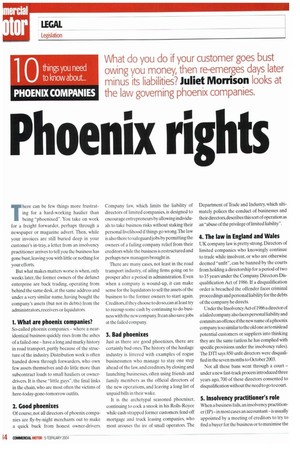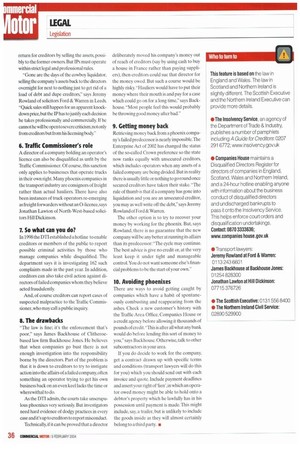Phoenix rights
Page 34

Page 38

If you've noticed an error in this article please click here to report it so we can fix it.
What do you do if your customer goes bust owing you money, then re-emerges days later minus its liabilities? Juliet Morrison !ooks at the law governing phoenix companies.
10
things you need to know about..
PHOENIX LIM 'Arl-m There can be few things more frustrating for a hard-working haulier than being "phoenixed". You take on work for a freight forwarder, perhaps through a newspaper or magazine advert. Then. while your invoices are still buried deep in your customer's in-tray, a letter from an insolvency practitioner arrives to tell you the business has gone bust, leaving you with little or nothing for your efforts.
But what makes matters worse is when, only weeks later, the former owners of the defunct enterprise are back trading, operating from behind the same desk. at the same address and under a very similar name, having bought the company's assets (but not its debts) from the administrators, receivers or liquidators.
1. What are phoenix companies? So-called phoenix companies where a nearidentical business quickly rises from the ashes
of a failed one a long and murky history in road transport, partly because of the structure of the industry. Distribution work is often handed down through forwarders, who own few assets themselves and do little more than subcontract loads to small hauliers or ownerdrivers. It is these "little guys", the final links in the chain, who are most often the victims of here-today-gone-tomorrow outfits.
2. Good phoenixes
Of course, not all directors of phoenix companies are fly-by-night merchants out to make a quick buck from honest owner-drivers. Company law, which limits the liability of directors of limited companies, is designed to encourage entrepreneurs by allowing individuals to take business risks without staking their personal livelihood if things go wrong.The law is also there to safeguard jobs by permitting the owners of a failing company relief from their creditors while the business is restructured and perhaps new managers brought in.
There are many cases, not least in the road transport industry, of ailing firms going on to prosper after a period in administration. Even when a company is wound-up, it can make sense for the liquidators to sell the assets of the business to the former owners to start again. Creditorsif they choose to do so, can at least try to recoup some cash by continuing to do business with the new company. It can also save jobs at the failed company.
3. Bad phoenixes
Just as there are good phoenixes, there are certainly bad ones.The history of the haulage industry is littered with examples of rogue businessmen who manage to stay one step ahead of the law, and creditors, by closing and launching businesses, often using friends and family members as the official directors of the new operations, and leaving a long list of unpaid bills in their wake.
It is the archetypal seasoned phoenixer. continuing to cock a snook in his Rolls-Royce while cash-strapped former customers fend off mortgage and truck leasing companies, who most arouses the ire of small operators. The Department of Trade and Industry, which ultimately polices the conduct of businesses and their directors, describes this sort of operation as an "abuse of the privilege of limited liability-.
4. The law in England and Wales UK company law is pretty strong. Directors of limited companies who knowingly continue to trade while insolvent, or who are otherwise deemed "unfit", can be banned by the courts from holding a directorship for a period of two to 15 years under the Company Directors Disqualification Act of 1986. If a disqualification order is breached the offender faces criminal proceedings and personal liability for the debts of the company he directs.
Under the InsolvencyAct of 1986 a director of a failed company also faces personal liability and commits an offence if the new name of a phoenix company is so similar to the old one as to mislead potential customers or suppliers into thinking they are the same (unless he has complied with specific provisions under the insolvency rules). The DTI says 850 unfit directors were disqualified in the seven months to October 2003.
Not all these bans went through a court under a new fast-track process introduced three years ago, 700 of these directors consented to disqualification without the need to go to court.
5. Insolvency practitioner's role When a business fails, an insolvency practitioner (IP)in most cases an accountant-is usually appointed by a meeting of creditors to try to find a buyer for the business or to maximise the
return for creditors by selling the assets, possibly to the former owners_ But TPs must operate within strict legal and professional rules.
"Gone are the days of the cowboy liquidator, selling the company's assets back to the directors overnight for next to nothing just to get rid of a load of debt and dupe creditors," says Jeremy Rowland of solicitors Ford & Warren in Leeds. "Quick sales still happen for an apparent knockdown price, hut the IP has to justify each decision he takes professionally and commercially. If he cannot he will be open to severe criticism,not only from creditors but from his licensing body,"
6. Traffic Commissioner's role
A director of a company holding an operator's licence can also be disqualified as unfit by the Traffic Commissioner. Of course, this sanction only applies to businesses that operate trucks in their own right. Many phoenix companies in the transport industry are consignors of freight rather than actual hauliers. There have also been instances of truck operators re-emerging as freight forwarders without an 0-licence,says Jonathan Lawton of North-West-based solicitors Hill Dickinson.
7. So what can you do?
In 1998 the DTI established a hotline to enable creditors or members of the public to report possible criminal activities by those who manage companies while disqualified. The department says it is investigating 162 such complaints made in the past year. In addition, creditors can also take civil action against directors of failed companies whom they believe acted fraudulently.
And, of course creditors can report cases of suspected malpractice to the Traffic Commissioner, who may call a public inquiry.
8. The drawbacks
"The law is tine; it's the enforcement that's poor," says James Backhouse of Clitheroebased law firm Backhouse Jones. He believes that when companies go bust there is not enough investigation into the responsibility borne by the directors. Part of the problem is that it is down to creditors to try to instigate action into the affairs of a failed company,often something an operator trying to get his own business back on an even keel lacks the time or wherewithal to do.
As the DTI admits, the courts take unscrupulous phoenixes very seriously. But investigators need hard evidence of dodgy practices in every case and it's up to creditors to report misconduct.
Technically, if it can be proved that a director deliberately moved his company's money out of reach of creditors (say by using cash to buy a house in France rather than paying suppliers). then creditors could sue that director for the money owed. But such a course would be highly risky. "Hauliers would have to put their money where their mouth is and pay for a case which could go on for a long time," says Backhouse. "Most people feel this would probably be throwing good money after bad."
9. Getting money back
Retrieving money back from a phoenix company's failed predecessor is nearly impossible.The Enterprise Act of 2002 has changed the status of the so-called Crown preference so the state now ranks equally with unsecured creditors, which includes operators when any assets of a failed company are being divided. But in reality there is usually little or nothing to go round once secured creditors have taken their stake. "The rule of thumb is that if a company has gone into liquidation and you are an unsecured creditor, you may as well write off the debt," says Jeremy Rowland of Ford &Warren.
The other option is to try to recover your money by working for the phoenix. But, says Rowland, there is no guarantee that the new company will be any better at running its affairs than its predecessor: "The cycle may continue. The best advice is give no credit or, at the very least keep it under tight and manageable control. You do not want someone else's financial problems to he the start of your own."
10. Avoiding phoenixes
There are ways to avoid getting caught by companies which have a habit of spontaneously combusting and reappearing from the ashes. Check a new customer's history with the Traffic Area Office, Companies House or a credit agency before allowing it thousands of pounds of credit."This is after all what any bank would do before lending this sort of money to you," says Backhouse. Otherwise, talk to other subcontractors in your area.
If you do decide to work for the company, get a contract drawn up with specific terms and conditions (transport lawyers will do this for you) which you should send out with each invoice and quote. Include payment deadlines and assert your right of 'lien',in which an operator owed money might be able to hold onto a debtor's property which he lawfully has in his possession until payment is made. This might include, say. a trailer, but is unlikely to include the goods inside as they will almost certainly belong to a third party to


































































































































































































